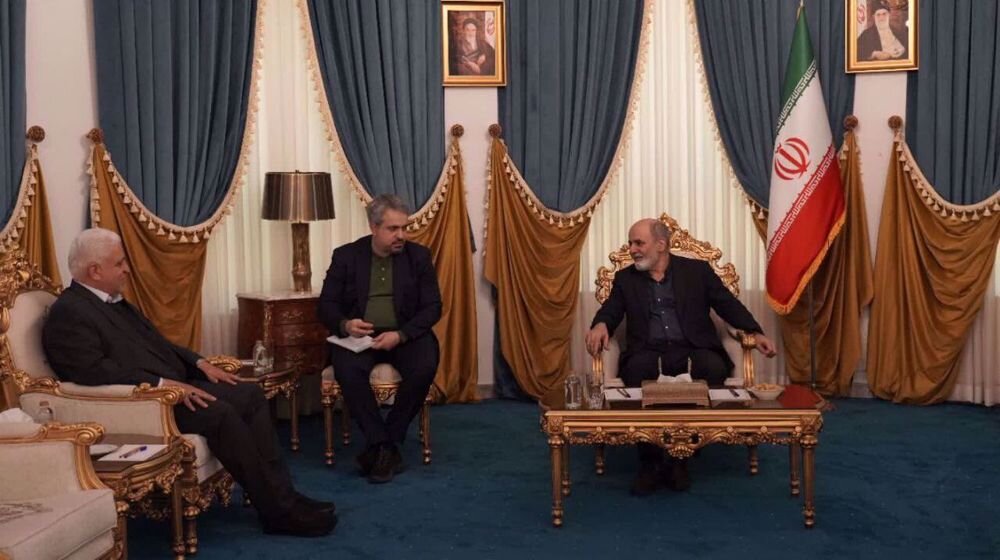Iran reaffirms support for Iraq as top security official meets with Hashd al-Sha’abi chief

TEHRAN – Ali Akbar Ahmadian, the Secretary of Iran’s Supreme National Security Council (SNSC), met with Falih al-Fayyadh, the head of Iraq’s Popular Mobilization Units (PMU), also known as Hashd al-Sha’abi, to discuss pressing regional developments and shared security concerns.
During their meeting on Tuesday, Ahmadian and al-Fayyadh examined the latest geopolitical shifts in the region and explored avenues for deepening Tehran-Baghdad cooperation. High on the agenda were the persistent threats facing both nations, including the resurgence of Daesh militants.
Reaffirming Iran’s unwavering support for Iraq, Ahmadian emphasized the "brotherly and close" ties between the two neighboring countries. He acknowledged the pivotal role of Hashd al-Sha’abi in reclaiming Iraqi territories from Daesh, underscoring the PMU's contribution to regional stability.
Despite Daesh’s formal defeat in Syria in late 2019 by the Damascus government and its allies, the terrorist group remains active, launching sporadic attacks in both Iraq and Syria. Concerns over its resurgence have grown following the fall of Bashar al-Assad’s government in December. Iraq has since declared its readiness to confront any threats that arise in the wake of this power shift.
“We will spare no effort to deter anyone who dares to violate Iraq’s sovereignty and territorial integrity,” al-Fayyadh asserted in a statement on December 13.
Reports from Iraq’s al-Maalomeh news agency, citing anonymous sources, suggest that Daesh remains operational in at least a dozen regions across Syria. Alarmingly, nearly half of the weapons in the hands of Daesh militants are believed to be of American origin, fueling suspicions that external actors may be secretly supplying the extremists.
Tehran's support for Sudan certain amid internal conflict
In a separate high-level diplomatic meeting, Ahmadian welcomed Sudanese Foreign Minister Ali Youssef Ahmed al-Sharif to Tehran on Tuesday, where they discussed key bilateral, regional, and international issues.
During the talks, Ahmadian emphasized the deep-rooted historical ties between Iran and Sudan, recalling Sudan’s long-standing revolutionary and anti-Western stance. He condemned Western powers for their unconditional support of Israel, contrasting it with Sudan’s historically firm opposition to Zionist policies.
Expressing concern over the ongoing violence in Sudan, Ahmadian stated, “We are deeply saddened by the suffering of the Sudanese people and firmly support the country’s legitimate government, which enjoys the backing of the majority.” He further expressed hope that the roots of instability in Sudan would soon be eradicated.
Highlighting foreign interference as a major factor preventing peace and unity in Sudan, Ahmadian accused Western nations of fueling conflicts in Muslim countries. “Wherever the Zionist regime is present, there is chaos and destruction,” he asserted, attributing Sudan’s turmoil in part to its historical support for the Palestinian cause.
For his part, Sudan’s Foreign Minister al-Sharif congratulated Iran on the 46th anniversary of the Islamic Revolution and acknowledged Iran’s steadfast support for Sudan’s stability. He claimed that the two-year-long conflict in Sudan has been externally orchestrated with the aim of fragmenting the country and plundering its resources.
He further accused Israel of being behind international plots against both Sudan and other nations in West Asia and East Africa. Expressing gratitude for Iran’s unwavering support, al-Sharif stated, “After two years of conflict, our military forces have successfully pushed back rebel factions. We deeply appreciate the solidarity shown by our Iranian allies.”
Looking ahead, al-Sharif emphasized Sudan’s commitment to strengthening strategic and long-term relations with Iran, particularly in the post-conflict rebuilding phase.
Leave a Comment